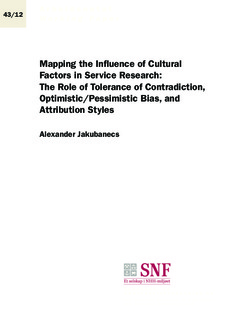| dc.description.abstract | This article applies the theories on tolerance for contradiction, optimistic/pessimistic bias, and dispositionism/situationism in the context of service research to identify previously unexplored moderators of the effects of inconsistent or contradictory brand experiences as well as the expectations towards and effects of coproduction processes on customer responses. We show that dialecticism, construal level theory (CLT), optimistic/pessimistic bias, and dispositionism/situationism are highly relevant in explaining inconsistent customer experiences of services as well as processes of expectations of successes/failures and attributions of the successes/failures in coproduction processes. For example, dialectics and high-construal-level customers relate to contradictory brand experiences in a more positive way than nondialectics and low-construal-level customers. Furthermore, customers with an independent (vs. interdependent) self-construal expect positive outcomes of coproduction for themselves (vs. others). Customers with high levels of dispositionism attribute successes (vs. failures) in outcomes of coproduction to themselves (vs. service provider). We formulate hypotheses to test the identified moderating effects of the theories. This conceptual development provides input for service providers to develop strategies to mitigate the negative effects of inconsistent brand experiences. Finally, we provide input for strategies to counter unwarranted pessimism towards service innovations as well as excessive credit of successful coproduction outcomes by customers to themselves and blaming the service providers for less successful outcomes. | no_NO |
